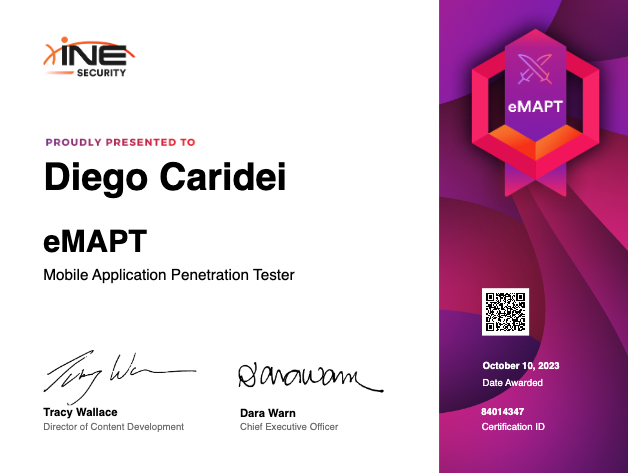
Introduction
Hello, everyone. This is a comprehensive review, I’ll be sharing insights into the eMAPTv2 course and exam. I’ll discuss study tips, exam preparation, prerequisites, and key details about the certification. Additionally, I’ll provide tips for successfully passing the exam.
Overview
The eLearnSecurity Mobile Application Penetration Testing (eMAPT) certification is a robust program designed for individuals with advanced knowledge of mobile application security. To achieve this certification, candidates must demonstrate expertise in various areas, including Android Java development, reverse engineering, exploiting vulnerabilities, understanding encryption, and identifying vulnerable implementations. The certification exam fee is $400, with two attempts available. In case of failure on the first attempt, candidates receive feedback on their submitted APK and source code, with a 7-day window for resubmission. As an alternative, individuals can enroll in the MASPT v2 course, which is part of the Mobile Application Penetration Testing Professional learning path.
Course & Exam Preparation
The eMAPTv2 course is divided into two parts: Android and iOS. However, this review focuses exclusively on the Android portion, as the iOS content is not included in the exam.
1. Android Architectures: The Android Architectures module delves into the layers of the Android system, providing insights into the application layer, framework layer, and Linux kernel layer. Understanding Android Architectures is fundamental for aspiring mobile application penetration testers. It empowers them to analyze the structure of Android applications effectively, preparing for potential security vulnerabilities.
2. Setting up a Testing Environment: This module guides students in establishing an appropriate testing environment for mobile application security testing. It covers the essential tools, platforms, and configurations necessary for conducting secure testing on emulators, virtual machines, or physical devices.
3. Android Build Process: The Android Build Process module explains the intricacies of building Android applications, including compiling source code, resource management, packaging, and signing applications. This knowledge is vital for identifying security vulnerabilities during development and build phases.
4. Reversing APKs: The Reversing APKs module equips students with reverse engineering skills for decompiling APK files, analyzing code and resources, and understanding application functionality. This is essential for uncovering hidden functionalities and identifying vulnerabilities.
5. Device Rooting: Focusing on gaining root access on Android devices, the Device Rooting module explores the benefits and risks of rooting, methods for rooting different devices, and implications for security testing.
6. Android Application Fundamentals: This module covers the foundational concepts of Android applications, providing a deep understanding of components like activities, services, content providers, and broadcast receivers. It’s crucial for assessing the structure and behavior of Android applications during penetration testing.
7. Network Traffic: In the Network Traffic module, students learn techniques for capturing, analyzing, and manipulating network traffic generated by Android applications, including identifying security vulnerabilities related to network interactions.
8. Device and Data Security: This module focuses on securing Android devices and user data by covering topics such as device settings, encryption, app permissions, and security risks mitigation.
9. Tapjacking: The Tapjacking module addresses the concept of overlaying malicious elements on legitimate user interfaces to deceive users. Students learn to identify and exploit tapjacking vulnerabilities in Android applications and explore defensive measures.
10. Static Code Analysis: This module delves into using static analysis techniques to identify security vulnerabilities in Android applications through source code analysis.
11. Dynamic Code Analysis: Dynamic Code Analysis involves instrumenting applications, capturing runtime behavior, and identifying vulnerabilities. It helps uncover security issues that may not be apparent in static analysis.
Exam
The eMAPTv2 exam lasts 7 days, focusing exclusively on Android. Candidates receive two vulnerable applications and must identify their vulnerabilities, which typically takes less time than developing a malicious application. To pass, candidates must submit the .apk file and source code of their exploit application.
Tips
- Basic Java and Android Development: It’s crucial to have a good grasp of Java and Android development basics.
- Study Course Material: Thoroughly studying the course material is essential for success.
- Develop Applications: Try to develop applications that exploit the labs provided in the course to gain hands-on experience.
- Understand Encryption: A basic understanding of encryption and decryption is important.
- Analyze Android Manifest: Gain proficiency in analyzing Android Manifest, reverse engineering, and reading code.
In summary, the eMAPTv2 course and exam are comprehensive and practical, requiring in-depth knowledge of mobile application security. Success in this certification demands not only theoretical understanding but also practical skills. Candidates who prepare diligently and follow the provided tips will be well-equipped to tackle the exam and earn this valuable certification. Good luck in your eMAPTv2 journey!
